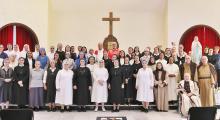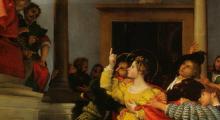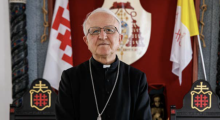Issued by the Catholic Center for Studies and Media - Jordan. Editor-in-chief Fr. Rif'at Bader - موقع أبونا abouna.org

Following is the text of the meditation by Cardinal Pierbattista Pizzaballa, Latin Patriarch of Jerusalem, on the 5th Sunday of ordinary time C, dated February 9, 2025:
The account of the vocation of the first disciples in the Gospel of Luke is interwoven with the story of the miraculous fishing. (Luke 5:1-11)
In Mark and Matthew, too, we see that Peter and his companions, when Jesus calls them, lay down their nets and boats after a night of fishing. But only Luke tells us that this fishing was unsuccessful and that Jesus asks them to fish again, to try once more. Only Luke tells us that this second fishing, which takes place in the sunlight, fills the nets with fish. (Luke 5:5-7)
He does not just fill the nets with fish. He also fills Peter with awe and all those present with awe. (Luke 5:9-10)
We get into the dynamic of this passage through a word we find in v. 8, where Peter, seeing the rich and inexplicable catch, asks Jesus to turn away “But when Simon Peter saw it, he fell down at Jesus’ knees, saying, “Go away from me, Lord, for I am a sinful man!” (Luke 5:8)
Behind Peter’s request lies a certain way of thinking about God and his relationship with us.
A way of thinking that says that God's holiness and man's sin cannot stand "side by side": one excludes the other. So where God is, sinful man cannot be, and where sinful man is, God cannot be. Man must first be converted, and then he can meet God.
However, this passage paints a good picture of the drama of man, because man alone is not able to do justice to his relationship with God. He does not manage to convert, to purify himself, to prepare himself in his own strength for the encounter with the Lord. The empty nets after a night of fishing are there to say this: much effort, but no result (“Master, we have worked all night long but have caught nothing.” (Luke 5,5)
Jesus sees this great weariness of man, and he wants to free him from this weariness, because it is not only an unfruitful weariness, but also a useless weariness.
In the Gospel of Matthew, (Mt 11:28-30) we hear Jesus calling out to all who are weary and oppressed and offering them rest and refreshment. So, it is not a question of turning away from Him, but on the contrary, of drawing near to Him.
Jesus' presence offers Peter the opportunity to recognize himself for what he is: a sinner who is unable to convert and come to God. (Lk 5:8) But this realization is not a reason to despair, on the contrary: it is the first step to opening oneself to the gift of God, which always precedes, just as the miraculous catch of fish precedes the calling of Peter and his disciples. It is the first step towards being able to hear the word truly and anew.
So, no one should turn away any further.
This verb, to turn away, occurs many times in Luke's Gospel. Jesus never turns away from anyone except after he has healed and saved them. And when he turns away, it is to look for other people, other people who, like Peter, are tired of the long barren night from which no one had been able to free him until then.
So, in the beginning there is the gift of God, his Word of mercy.
As the Gospel reading continues, we will see that this gift has no price, but it has a condition, and the condition is that we know how to share it. God never demands that it be given back to Him, but He does demand that it be shared among the brothers.
In today's Gospel, these "brothers" appear twice.
The first time is when Peter goes out fishing but is unable to bring all the fish ashore on his own. The gift is too great for him alone and he will only be able to receive it if he shares it with others (“So they signaled their partners in the other boat to come and help them. And they came and filled both boats, so that they began to sink”. (Luke 5:7)
The second is to be found in the words of Jesus, who reassures Peter and opens up a wider horizon of life for him. He sends him out to share the hope of life that he encountered that morning on the shore of the Sea of Galilee with everyone, thereby completely changing his way of thinking about God and thus his whole life. “Do not be afraid; from now on you will be catching people.” (Luke 5:10)
+Pierbattista







